Being psychologically prepared for a running race is just as important as being physically prepared for it.
This is according to Tan Bak Guan, a Senior Psychologist from the Centre of Excellence for Soldier Performance (CESP). He gave a talk last Tuesday at the Safra Mount Faber clubhouse – on the importance of being mentally prepared for a running race.
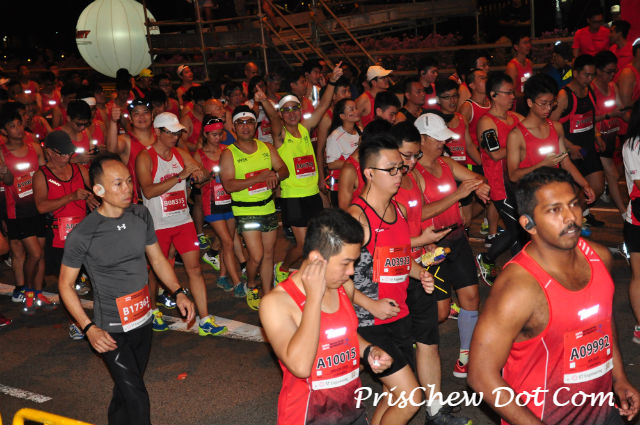
You may be physically prepared for a running race, but are you psychologically prepared for it?
The talk was from one of the ‘Soldier Strong’ training programmes, which are a series of complimentary theoretical and practical training sessions currently taking place, to prepare runners for the Safra Singapore Bay Run & Army Half Marathon in August this year.
Said Tan, “40 per cent of the time, runners think about distance and pace when they start running, that is, how fast or slow they should go. Then after running for some time, they will feel the pain and fatigue. To take their mind off these thoughts, 28 per cent will focus on the scenery. It is normal to think of pain during a race; that is why we need mindful tips.”
At the beginning of say, a half marathon race, Tan pointed out that a runner’s morale is high, then this drops significantly after the first couple of kilometres.
Said Tan, “You ask yourself why you are running as you have not got into the rhythm yet.”
It takes about 3km for the average runner to get into the rhythm of running.
Said Tan, “Then you will enjoy the race, and your morale picks up again. But over time you will feel fatigue and your morale drops again.”
For Tan, when he runs a half marathon, it is around the 16-18km point when he feels the aches and pains on his knee and he starts to struggle and questions why he is running.
Said Tan, “So be mindful about this 16km-18km point when you feel the strain and you are tempted to walk. If you can bear it though, do a slow jog.”
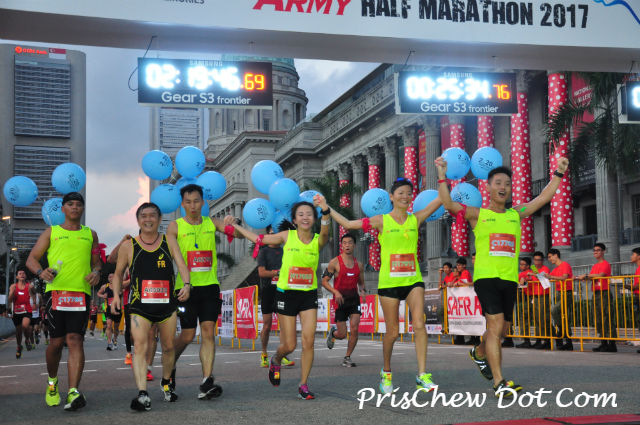
The morale of runners picks up when they see the finishing line.
Tan added, “But then in the last 2km, your morale picks up again because you know you will finish the race. So pride overtakes tiredness and you do not want to be seen walking to the finish line.”
To prep yourself mentally for the struggles during the 16km-18km mark of the half marathon, Tan has some mindful tips for runners, to resist the temptation to walk, thus giving up on their timing goals.
Tan also added that the first-letter abbreviations of these tips spell out the word ‘TEMPO’ – which is a type of running workout that is done at a moderate intensity and should feel comfortably hard.
These tips are as follows.
T – Tangible Rewards
Said Tan, “You can look forward to tangible rewards such as the post-run massage and set realistic goals for yourself when you are training. Start slow and progressively increase your stamina too. Do not rush into things, for example, run 15km at one go, if your body is not prepared for it. This is especially for those who are running the half marathon for the first time.”
This is also applicable too, for seasoned runners who are aiming for a new personal best and will thus need to train at their desired pace. Rather than suddenly trying to run 21.1km at goal pace, they should gradually allow their body to get used to the faster pace, and take it slowly from there.

Set yourself realistic goals.
E – Executable Mini-Goals
Throughout the race, Tan also pointed out that instead of thinking about how far you have left to go, try and focus on smaller goals.
He explained, “During the run, you have a lot of thoughts going through your head like your pace and distance, and whether you can sustain your pace.”
Continued Tan, “But instead of thinking that you have 20km left to cover after you see the 1KM marker, think instead about the next water point being 2km-3km away. Break the race down into smaller segments to make it feel more manageable.”
He added, “It can also be as simple as, ‘I can see the guy in front of me slowing down; I can overtake him.’”
M – Mental Imagery
Having images in your head on how the race may go will help, according to Tan. He in fact, pointed out that this is a tactic used by many of the top sportsmen in the world such as swimmer Michael Phelps.
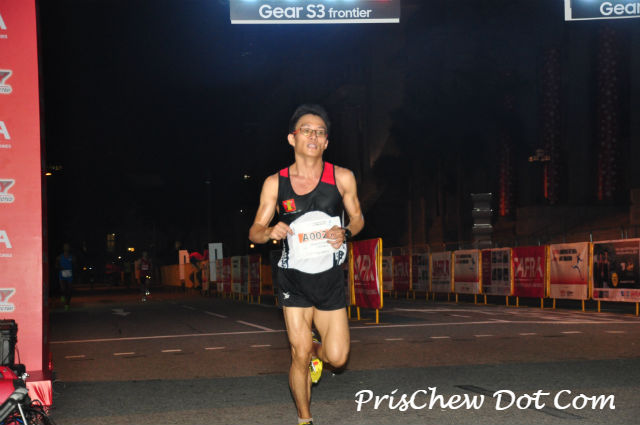
Mental imagery can help you with your preparations for a race.
Said Tan, “Phelps spends one to two hours doing mental imagery. So he imagines himself going to the pool and doing his stroke and by a certain point, he will make the flip. His mental imagery is so strong that he can imagine that he will flip and turn back at exactly the 15th stroke.”
Tan added, “He also practises all sorts of ‘what if’ scenarios for example, what if his goggles break when he is swimming? So if it really does happen, then he has no problems because he had already factored everything in. That is the power of strong mental imagery and self-discipline.”
Tan continued too, that for himself, he did a biathlon once, and because everyone was going out so hard in the water, he ended up getting kicked.
Said Tan, “I panicked at first and then I told myself to calm down. I also ended up drinking a lot of water when I was training my swimming stroke – but I told myself that I could not panic in the middle of the sea so I had to overcome that.”
He continued, “If you are mentally psyched up for such challenges, then you will not be so shaken up on the day of the race. It is the split seconds when you are indecisive, that affect the outcome of your race.”
For runners though, such scenarios that you could include in your mental imagery can be, for instance, what happens if you get cramp in the middle of the race.
P – Power Words
This is also known as self-talk according to Tan, and there are four types:
- Negative – E.g. I can’t do this anymore
- Positive – E.g. I can do this
- Technical – E.g. I must open my stride
- Neutral – E.g. what is for lunch?
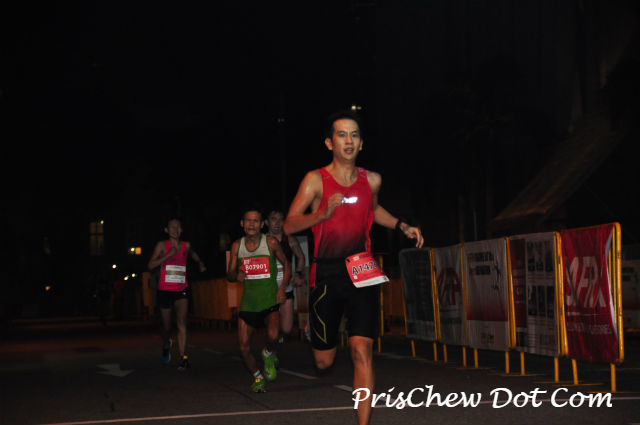
Talk to yourself when you are running.
Said Tan, “It is important to talk to yourself during the run. For example if you are experiencing pain, your body will tell you to give up so you need to inject and think of more positive self-talk rather than letting the negative ones overwhelm you.”
So instead of telling yourself, ‘I should be sleeping; it is 5am in the morning’, you should instead think, ‘I can do this’ or ‘I can complete this race’ to motivate yourself to keep on running, according to Tan.
O – Off-Focus
This is also known as distractions, and Tan explained that we need to distract our mind from i.e. pain that we may be experiencing as we are running.
Said Tan, “So people distract themselves by looking at the scenery, or they focus on their breathing, or they may put on their earphones to run and focus on their music – so that they will not feel the pain; it is a form of temporary relief.”
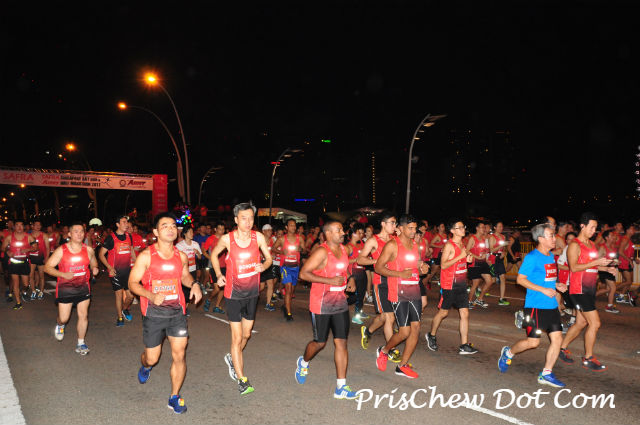
Distractions can take your mind off the run.
Mind Over Body
Tan says that the mind is a very powerful tool when it comes to running or any other sports, as an athlete who is strong mentally, can triumph over an athlete who is mentally weak – providing both have the same level of physical fitness.
But Tan added, “Of course, no matter how much mindful tips you have, though, you need to actually run if you are preparing for the Army Half Marathon. You cannot just imagine that you are finishing the race – without even taking a single step forward!”
Slope Training
Following the talk on the psychology of running and mental imagery, we were then taken to Telok Blangah Park, where Salman, a Combat Fitness Trainer from the CESP, had led us through a hill running session.
We began the session with a warm-up consisting of one round of dynamic exercises such as butt kicks and sideways running, up a 200m hill at the park.

Hill running is also known as resistance training.
Then the main session comprised of about five sets of fast interval sprints up the hill. For each sprint set, Salman instructed us to maintain the same pace throughout. We would recover from each set by jogging slowly down the hill, and then stopping completely for a few seconds before continuing with the next set.
The session took about 20 minutes, and once we were done with the intervals, we were led through a simple cool-down in order to get our heart rates back to normal again.
It had been a short but intense session, and this gave me a reality check too – because it made me realise that I am definitely not as fit as I had originally thought – when it comes to sprinting up a hill!
So this means that I will probably have to incorporate more of such sessions into my training as I prepare for my 21.1km race at the Safra Singapore Bay Run & Army Half Marathon, which will be taking place in about two months’ time – on the 26th of August.
Hill running sessions are also known as resistance training and according to Salman and his team, these are part of strength building. This means that doing such sessions regularly helps to build your muscles so that you will not feel as fatigued in the latter stages of the race, when you are running long distances such as the half marathon.
In Conclusion
I had thought that this was an interesting and informative session indeed and had given me insights into another aspect of running – the impact of the mind on how well a race goes.
While I already know of the importance of physically training for an endurance race, the talk had enlightened me on the fact that being mentally prepared for the run is just as important as clocking the miles.

These are tips that I would definitely be able to use, in my preparations for AHM 2018.
So I would say that these are tips that I can definitely use and apply in both my training as well as during the race, on 26 August.
Registration for the Safra Singapore Bay Run & Army Half Marathon is now open. Sign up for the run at: http://www.safra.sg/participate/singapore-bay-run.

Leave a Comment